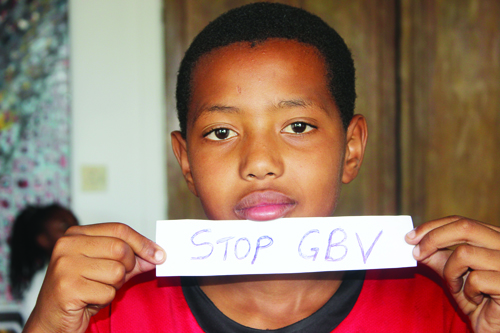The Media Institute of Southern Africa (MISA)’s Namibia chapter, in collaboration with Sister Namibia and LifeLine/Childline, facilitated a two-day media and information literacy workshop on 15 to 17 November at the Hodygos Training Centre in Okahandja.
Attended by forty youth, the workshop aimed at looking at the influence of the media and encouraging critical thinking about the messages passed on through the media. It intended on sensitising the participants on how the promotion of violence and objectification of women fuels up gender-based violence, the involvement of men in the fight against gender-based violence, and developing key messages for the 16 Days of Activism against gender-based violence.
Day one of the two-day workshop featured an analysis on how music fuels gender-based violence and the impact it has on the youth. Song lyrics such as of the famous ‘Blurred Lines’ by Robin Thicke featuring T.I. and Pharell Williams and ‘My name is…’ by Eminem were brought to the attention of the participants to clearly analyse what message these artists sent out. “The messages sent through these songs are very influential. Firstly, they promote violence and objectify women. Women are called filthy names such as w****s and b****s. The impact this has on young people is that they simply imitate all that they hear and get to do the same tomorrow. Some young people laugh and dance to these songs without even knowing what the lyrics say,” said 16-year-old participant Lavinia Titus.
The day also looked at the marketing language and advertisements that come through the media. This session enjoyed a number of advertisements of famous brands such as that of Dolce and Gabana. It brought to light the indirect messages such as those on women abuse and the promotion of many other social problems. Presentations by Sister Namibia questioned whether women should be concerned about how they looked. This is in reference to how women are perceived in the media world. This session looked at the social pressure that is posed upon women on how they should look. “You would find that many times, young girls are so worried about how they look. They would be very concerned on how the boy who passes by would say to them. It is by this time young girls and women start appreciating how they look and finding the true inner beauty in themselves.
Women’s looks should not be defined by men, but by themselves,” says 16-year-old participant, Johanna Swartbooi. The participants further suggested to redefine the word “sexy” as to that of someone who is independent and a goal-getter as opposed to its current use – sexually appealing.
Day two of the workshop featured a presentation on the role of the media by MISA Namibia National Director, Natasha Tibinyane. Natasha pointed out that the media plays a huge role; “the media is very powerful and critically important in a democratic country,” she said. As one of the roles of the media, the National director informed the participants that it is the duty of the media to inform and educate. This session brought about opinions from the participants as some young children felt that they need to see more educational programmes from the NBC. As with the newspapers, participants pointed out that they would like to be involved in the selection of information they want to read. Natasha also touched on the importance of a reading culture, “young people need to read so that they have a lot of information,” she said.
Lifeline/Childline’s Lizette Feris presented on the role of social media such as Facebook, Twitter and Blogs. The discussion bunderlined how powerful these mediums are with their positives and negatives. “Social media is exceptionally powerful, so one should check out what they write before they post it,” she said. This was in reference to past cases whereby social networks such as Facebook damaged people’s reputations. “Social media is often negatively used by cyber-bullies, thus, you should be careful with the type of photos you upload,” said Lizette. On rights and responsibilities, Lizette bolded the participation of children in children oriented subjects. She made reference to the Child Care Protection Bill, stating, “it can help Namibians help themselves.” The last session of the day featured messages from the participants for the ’16 Days of Activism against Gender-Based Violence’ that are to start as from the 25th November to the 10th December. Participants came up with strong messages and slogans such as “Silence will get you killed”, “The less skin you show, the sexier you look” and many others.
Reflecting on day two the the two-day workshop, “we learned so much from the young people. They have great abilities to bring change and all they need is the support. We have realised that we have to take this initiative further and feature youth from other regions,” said Natasha. Sister Namibia’s Director Vida de Voss reflected on the workshop, saying it was a success and pointed the way forward. She, however, pointed out that it is not only the duty of NGOs to demand from the media, stating “we should not tell the media what the youth want; we should ask the youth what they want from the media and thus I regard the workshop as a resounding success,” she said.
Stay informed with The Namibian – your source for credible journalism. Get in-depth reporting and opinions for
only N$85 a month. Invest in journalism, invest in democracy –
Subscribe Now!










